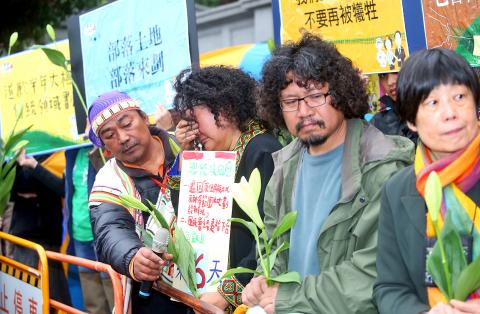New regulations announced by the Council of Indigenous Peoples that exclude privately held land from being recognized as traditional Aboriginal territory perpetuate the injustices done to Aborigines for more than a century, Aboriginal rights advocates said yesterday in Taipei.
A group of protesters, who have been staging a “sleepout” on Ketagalan Boulevard down the street from the Presidential Office Building since Thursday last week, offered lilies to commemorate the 70th anniversary of the 228 Incident and called for the restoration of traditional Aboriginal territories and transitional justice for all Taiwanese, regardless of ethnicity.
Several of the protesters had planned to attend a commemoration ceremony at the 228 Peace Memorial Park to offer condolences to families of the victims of the 228 Massacre, but were prevented from entering the venue.

Photo: CNA
The council on Feb. 14 announced guidelines on the delineation of traditional Aboriginal territories that would restrict the application of the “traditional area” label to government-owned land, explicitly excluding private land.
The exclusion has sparked heated debate. A large amount of Aboriginal territory has been privatized and the exclusion would deprive Aborigines of the rights to participate in the development of traditional territories that were seized and privatized by the Japanese colonial and the Republic of China (ROC) governments, campaigners have said.
Much of the land owned by state-run Taiwan Sugar Corp and private hotel chains in eastern Taiwan was the hunting grounds of Amis communities for hundreds of years, and the new guidelines would only serve to legalize and entrench the misappropriation of Aboriginal land, said documentary filmmaker Mayaw Biho, an Amis and a former director of the state-run Taiwan Indigenous Television.
President Tsai Ing-wen’s (蔡英文) apology for the historical oppression of Aborigines in August last year gave them hope, but the government has once again rejected Aborigines’ rights to their traditional territories, Mayaw said.
“Half a year has passed since the apology, but the ROC government has continued to ignore the plight of the Aborigines,” he said.
“The ROC government takes advantage of Aborigines when it wants to promote the image of Taiwan, but it never relents when it comes to sacrificing their interests,” said singer Nabu Husungan Istanda, who is a Bunun.
“Although it is absolutely correct that the government has sought to address the 228 Incident and the issue of transitional justice, the nation has yet to make an equal effort to redress the injustices done to Aborigines,” said singer-activist Panai Kusui, who is an Amis.
The guidelines are a political expedient agreed between Minister Without Portfolio Chang Ching-sen (張景森) and Council of Indigenous Peoples Minister Icyang Parod, which override Aboriginal rights by using the Han Chinese concept of private ownership, said Lin Fei-fan (林飛帆), one of the leaders of the Sunflower movement in 2014.
“Many Aborigines are willing to negotiate with the government about the conflict between private ownership [and the delineation of traditional areas], but I want to ask if the government is willing to offer such an opportunity,” Lin said.

Chinese spouse and influencer Guan Guan’s (關關) residency permit has been revoked for repeatedly posting pro-China videos that threaten national security, the National Immigration Agency confirmed today. Guan Guan has said many controversial statements in her videos posted to Douyin (抖音), including “the red flag will soon be painted all over Taiwan” and “Taiwan is an inseparable part of China,” and expressing hope for expedited reunification. The agency last year received multiple reports alleging that Guan Guan had advocated for armed reunification. After verifying the reports, the agency last month issued a notice requiring her to appear and explain her actions. Guan

GIVE AND TAKE: Blood demand continues to rise each year, while fewer young donors are available due to the nation’s falling birthrate, a doctor said Blood donors can redeem points earned from donations to obtain limited edition Formosan black bear travel mugs, the Kaohsiung Blood Center said yesterday, as it announced a goal of stocking 20,000 units of blood prior to the Lunar New Year. The last month of the lunar year is National Blood Donation Month, when local centers seek to stockpile blood for use during the Lunar New Year holiday. The blood demand in southern Taiwan — including Tainan and Kaohsiung, as well as Chiayi, Pingtung, Penghu and Taitung counties — is about 2,000 units per day, the center said. The donation campaign aims to boost

The Kaohsiung Tourism Bureau audited six hotels in an effort to prevent price gouging ahead of Korean band BTS’ concert tour in the city scheduled for Nov. 19, 21 and 22 this year. The bureau on Friday said that the audits — conducted in response to allegations of unfair pricing posted on social media — found no wrongdoing. These establishments included the local branches of Chateau de Chine, Hotel Nikko, My Humble House, and Grand Hai Lai, it said, adding that the Consumer Protection Commission would have penalized price gougers had the accusations been substantiated. The bureau said the Tourism Development Act

BACK TO WINTER: A strong continental cold air mass would move south on Tuesday next week, bringing colder temperatures to northern and central Taiwan A tropical depression east of the Philippines could soon be upgraded to be the first tropical storm of this year, the Central Weather Administration (CWA) said yesterday, adding that the next cold air mass is forecast to arrive on Monday next week. CWA forecaster Cheng Jie-ren (鄭傑仁) said the first tropical depression of this year is over waters east of the Philippines, about 1,867km southeast of Oluanpi (鵝鑾鼻), and could strengthen into Tropical Storm Nokaen by early today. The system is moving slowly from northwest to north, and is expected to remain east of the Philippines with little chance of affecting Taiwan,